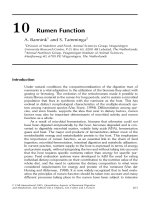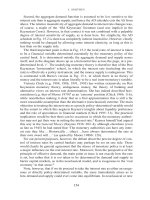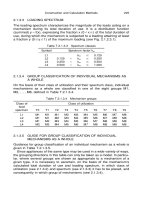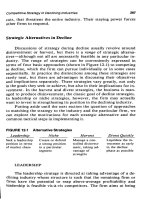Economic Policy Thoughts for Today and Tomorrow phần 8 doc
Bạn đang xem bản rút gọn của tài liệu. Xem và tải ngay bản đầy đủ của tài liệu tại đây (723.54 KB, 12 trang )
72 ECONOMIC POLICY
Because a certain group of people believes that full
employment can be attained only by inflation, inflation
is accepted in the United States. But people are discuss-
ing the question: Should we have a sound currency with
unemployment, or inflation with full employment? This
is in fact a very vicious analysis.
To deal with this problem we must raise the question:
How can one improve the condition of the workers and
of all other groups of the population? The answer is: by
maintaining an unhampered labor market and thus
achieving full employment. Our dilemma is, shall the
market determine wage rates or shall they be deter-
mined by union pressure and compulsion? The dilemma
is not "shall we have inflation or unemployment?"
This mistaken analysis of the problem is argued in
England, in European industrial countries and even in
the United States. And some people say: "Now look,
even the United States is inflating. Why should we not
do it also."
To these people one should answer first of all: "One
of the privileges of a rich man is that he can afford to be
foolish much longer than a poor man." And this is the
situation of the United States. The financial policy of the
United States is very bad and is getting worse. Perhaps
the United States can afford to be foolish a bit longer
than some other countries.
The most important thing to remember is that infla-
tion is not an act of God; inflation is not a catastrophe
of the elements or a disease that comes like the plague.
Inflation is a policy—a deliberate policy of people who
resort to inflation because they consider it to be a lesser
evil than unemployment. But the fact is that, in the not
very long run, inflation does not cure unemployment.
Inflation is a policy. And a policy can be changed.
Inflation 73
Therefore, there is no reason to give in to inflation. If one
regards inflation as an evil, then one has to stop inflating.
One has to balance the budget of the government. Of
course,
public opinion must support this; the intellectu-
als must help the people to understand. Given the sup-
port of public opinion, it is certainly possible for the
people's elected representatives to abandon the policy
of inflation.
We must remember that, in the long run, we may all
be dead and certainly will be dead. But we should ar-
range our earthly affairs, for the short run in which we
have to live, in the best possible way. And one of the
measures necessary for this purpose is to abandon infla-
tionary policies.
Lecture
Foreign Investment
Some people call the programs of economic freedom a
negative program. They say: "What do you liberals
really want? You are against socialism, government in-
tervention, inflation, labor union violence, protective tar-
iffs You say 'no' to everything."
I would call this statement a one-sided and shallow
formulation of the problem. For it is possible to formu-
late a liberal program in a
positive
way. If a man says: "I
am against censorship," he is not negative; he is
in favor
of authors having the right to determine what they want
to publish without the interference of government. This
is not negativism, this is precisely freedom. (Of course,
when I use the term "liberal" with respect to the condi-
tions of the economic system, I mean liberal in the old
classical
sense of the word.)
Today, most people regard the considerable differ-
ences in the standard of living between many countries
as unsatisfactory. Two hundred years ago, conditions in
Great Britain were much worse than they are today in
India. But the British in 1750 did not call themselves
"undeveloped" or "backward," because they were not
in a position to compare the conditions of their country
with those of countries in which economic conditions
were more satisfactory. Today all people who have not
75
76 ECONOMIC POLICY
attained the average standard of living of the United
States believe that there is something wrong with their
own economic situation. Many of these countries call
themselves "developing countries'' and, as such, are ask-
ing for aid from the so-called developed or even overde-
veloped countries.
Let me explain the reality of this situation. The stand-
ard of living is lower in the so-called developing coun-
tries because the average earnings for the same type of
labor is lower in those countries than it is in some coun-
tries of Western Europe, Canada, Japan, and especially
in the United States. If we try to find the reasons for this
difference, we must realize that it is not due to an inferi-
ority of the workers or other employees. There prevails
among some groups of North American workers a tend-
ency to believe that they themselves are better than other
people—that it is through their own merit that they are
getting higher wages than other people.
It would only be necessary for an American worker
to visit another country—let us say, Italy, where many
American workers came from—in order to discover that
it is not his personal qualities but the conditions in the
country that make it possible for him to earn higher
wages. If a man from Sicily immigrates to the United
States, he can very soon earn the wage rates that are
customary in the United States. And if the same man
returns to Sicily, he will discover that his visit to the
United States did not give him qualities which would
permit him to earn higher wages in Sicily than his fellow
countrymen.
Nor can one explain this economic situation by assum-
ing any inferiority on the part of the entrepreneurs out-
side the United States. It is a fact that outside of the
United States, Canada, Western Europe, and certain
Foreign Investment 77
parts of Asia the equipment of the factories and the tech-
nological methods employed are, by and large, inferior
to those within the United States. But this is not due to
the ignorance of the entrepreneurs in those "undevel-
oped" countries. They know very well that the factories
in the United States and Canada are much better
equipped. They themselves know everything they must
know about technology, and if they do not, they have
the opportunity to learn what they must know from text-
books and technical magazines which disseminate this
knowledge.
Once again: the difference is not personal inferiority
or ignorance. The difference is the supply of capital, the
quantity of capital goods available. In other words, the
amount of capital invested per unit of the population is
greater in the so-called advanced nations than in the
developing nations.
A businessman cannot pay a worker more than the
amount added by the work of this employee to the value
of the product. He cannot pay him more than the cus-
tomers are prepared to pay for the
additional
work of this
individual worker. If he pays him more, he will not re-
cover his expenditures from the customers. He incurs
losses and, as I have pointed out again and again, and
as everybody knows, a businessman who suffers losses
must change his methods of business, or go bankrupt.
The economists describe this state of affairs by saying
"wages are determined by the marginal productivity of
labor." This is only another expression for what I have
just said before. It is a fact that the scale of wages is
determined by the amount a man's work increases the
value of the product. If a man works with better and
more efficient tools, then he can perform in one hour
much more than a man who works one hour with less
78 ECONOMIC POLICY
efficient instruments. It is obvious that 100 men working
in an American shoe factory, equipped with the most
modern tools and machines, produce much more in the
same length of time than 100 shoemakers in India, who
have to work with old-fashioned tools in a less sophisti-
cated way.
The employers in all of these developing nations
know very well that better tools would make their own
enterprises more profitable. They would like to build
more and better factories. The only thing that prevents
them from doing it is the shortage of capital. The differ-
ence between the less developed and the more devel-
oped nations is a function of time: the British started to
save sooner than all other nations: they also started
sooner to accumulate capital and to invest it in business.
Because they started sooner, there was a higher standard
of living in Great Britain when, in all other European
countries, there was still a lower standard of living.
Gradually, all the other nations began to study British
conditions, and it was not difficult for them to discover
the reason for Great Britain's wealth. So they began to
imitate the methods of British business.
Since other nations started later, and since the British
did not stop investing capital, there remained a large
difference between conditions in England and conditions
in those other countries. But something happened which
caused the headstart of Great Britain to disappear.
What happened was the greatest event in the history
of the nineteenth century, and this means not only in the
history of an individual country. This great event was
the development, in the nineteenth century, of foreign
investment. In 1817, the great British economist Ricardo
still took it for granted that capital could be invested
only within the borders of a country. He took it for
Foreign Investment
79
granted that capitalists would not try to invest abroad.
But a few decades later, capital investment abroad began
to play a most important role in world affairs.
Without capital investment, it would have been neces-
sary for nations less developed than Great Britain to start
with the methods and the technology with which the
British had started in the beginning and middle of the
eighteenth century, and slowly, step by step—always far
below the technological level of the British economy—
try to imitate what the British had done.
It would have taken many, many decades for these
countries to attain the standard of technological develop-
ment which Great Britain had reached a hundred years
or more before them. But the great event that helped all
these countries was foreign investment.
Foreign investment meant that British capitalists in-
vested British capital in other parts of the world. They
first invested it in those European countries which, from
the point of view of Great Britain, were short of capital
and backward in their development. It is a well-known
fact that the railroads of most European countries, and
also of the United States, were built with the aid of Brit-
ish capital. You know that the same happened in this
country, in Argentina.
The gas companies in all the cities of Europe were also
British. In the mid 1870s, a British author and poet criti-
cized his countrymen. He said: "The British have lost
their old vigor and they have no longer any new ideas.
They are no longer an important or leading nation in the
world." To which Herbert Spencer, the great sociologist,
answered: "Look at the European continent. All Euro-
pean capitals have light because a British gas company
provides them with gas." This was, of course, in what
seems to us the "remote" age of gas lighting. Further
80 ECONOMIC POLICY
answering this British critic, Herbert Spencer added:
"You say that the Germans are far ahead of Great Britain.
But look at Germany. Even Berlin, the capital of the Ger-
man Reich, the capital of Geist, would be in the dark if a
British gas company had not invaded the country and
lighted the streets."
In the same way, British capital developed the rail-
roads and many branches of industry in the United
States. And, of course, as long as a country imports capi-
tal its balance of trade is what the noneconomists call
"unfavorable." That means that it has an excess of im-
ports over exports. The reason for the "favorable balance
of trade" of Great Britain was that the British factories
sent many types of equipment to the United States, and
this equipment was not paid for by anything other than
shares of American corporations. This period in the his-
tory of the United States lasted, by and large, until the
1890s.
But when the United States, with the aid of British
capital—and later with the aid of its own procapitalistic
policies—developed its own economic system in an un-
precedented way, the Americans began to buy back the
capital stocks they had once sold to foreigners. Then the
United States had a surplus of exports over imports. The
difference was paid by the importation—by the repatria-
tion,
as one called it—of American common stock.
This period lasted until the First World War. What
happened later is another story. It is the story of the
American subsidies for the belligerent countries in be-
tween and after two world wars: the loans, the invest-
ments the United States made in Europe, in addition to
lend-lease, foreign aid, the Marshall Plan, food that was
sent overseas, and other subsidies. I emphasize this be-
cause people sometimes believe that it is shameful or
Foreign Investment
81
degrading to have foreign capital working in their coun-
try. You have to realize that, in all countries except Eng-
land, foreign capital investment played a considerable
part in the development of modern industries.
If I say that foreign investment was the greatest his-
torical event of the nineteenth century, you must think
of all those things that would not have come into being
if there had not been any foreign investment. All the
railroads, the harbors, the factories and mines in Asia,
and the Suez Canal and many other things in the West-
ern hemisphere, would not have been constructed had
there been no foreign investment.
Foreign investment is made in the expectation that it
will not be expropriated. Nobody would invest anything
if he knew in advance that somebody would expropriate
his investments. At the time when these foreign invest-
ments were made in the nineteenth century, and at the
beginning of the twentieth century, there was no ques-
tion of expropriation. From the beginning, some coun-
tries showed a certain hostility toward foreign capital,
but for the most part they realized very well that they
derived an enormous advantage from these foreign in-
vestments.
In some cases, these foreign investments were not
made directly to foreign capitalists, but indirectly by
loans to the foreign government. Then it was the govern-
ment that used the money for investments. Such was, for
instance, the case in Russia. For purely political reasons,
the French invested in Russia, in the two decades preced-
ing the First World War, about twenty billion gold
francs, lending them chiefly to the Russian government.
All the great enterprises of the Russian government—for
instance, the railroad that connects Russia from the Ural
Mountains, through the ice and snow of Siberia, to the
82 ECONOMIC POLICY
Pacific—were built mostly with foreign capital lent to the
Russian government. You will realize that the French did
not assume that one day there would be a communist
Russian government that would simply declare it would
not pay the debts incurred by its predecessor, the tsarist
government.
Starting with the First World War, there began a pe-
riod of worldwide open warfare against foreign invest-
ments. Since there is no remedy to prevent a government
from expropriating invested capital, there is practically
no legal protection for foreign investments in the world
today. The capitalists did not foresee this. If the capital-
ists of the capital exporting countries had realized it, all
foreign investments would have come to an end forty
or fifty years ago. But the capitalists did not believe that
any country would be so unethical as to renege on a
debt, to expropriate and confiscate foreign capital. With
these acts, a new chapter began in the economic history
of the world.
With the end of the great period in the nineteenth
century when foreign capital helped to develop, in all
parts of the world, modern methods of transportation,
manufacturing, mining, and agriculture, there came a
new era in which the governments and the political par-
ties considered the foreign investor as an exploiter who
should be expelled from the country.
In this anti-capitalist attitude the Russians were not
the only sinners. Remember, for example, the expropria-
tion of the American oil fields in Mexico, and all the
things that have happened in this country (Argentina)
which I have no need to discuss.
The situation in the world today, created by the sys-
tem of expropriation of foreign capital, consists either of
direct expropriation or of indirect expropriation through
Foreign Investment
83
foreign exchange control or tax discrimination. This is
mainly a problem of developing nations.
Take, for instance, the biggest of these nations: India.
Under the British system, British capital—predominately
British capital, but also capital of other European coun-
tries—was invested in India. And the British exported
to India something else which also has to be mentioned
in this connection; they exported into India modern
methods of fighting contagious diseases. The result was
a tremendous increase in the Indian population and a
corresponding increase in the country's troubles. Facing
such a worsening situation, India turned to expropria-
tion as a means of dealing with its problems. But it was
not always direct expropriation; the government har-
assed foreign capitalists, hampering them in their invest-
ments in such a way that these foreign investors were
forced to sell out.
India could, of course, accumulate capital by another
method: the
domestic
accumulation of capital. However,
India is as hostile to the domestic accumulation of capital
as it is to foreign capitalists. The Indian government says
it wants to industrialize India, but what it really has in
mind is to have
socialist
enterprises.
A few years ago the famous statesman Jawaharlal
Nehru published a collection of his speeches. The book
was published with the intention of making foreign in-
vestment in India more attractive. The Indian govern-
ment is not opposed to foreign investment
before
it is
invested. The hostility begins only when it is
already
in-
vested. In this book—I am quoting literally from the
book—Mr. Nehru said: "Of course, we want to socialize.
But we are not opposed to private enterprise. We want
to encourage in every way private enterprise. We want
to promise the entrepreneurs who invest in our country,









